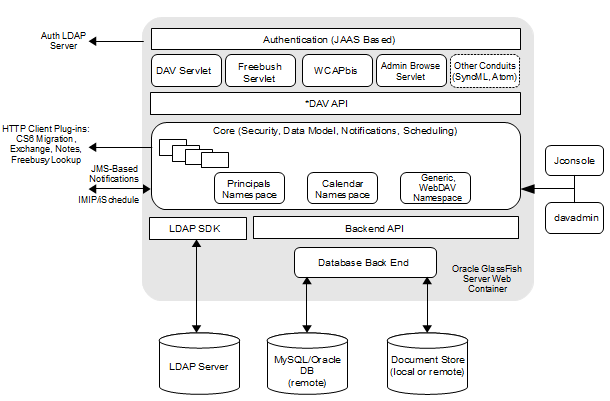1 Overview of Calendar Server
This chapter provides an introduction to Oracle Communications Calendar Server.
About Calendar Server
Calendar Server (also referred to as Calendar Server 7 and formerly known as Calendar Server for CALDAV Clients and Sun Java System Calendar Server) is a carrier-grade, highly scalable, secure, and reliable calendaring and scheduling platform. Calendar Server is compliant with the latest calendaring and scheduling standards, including the CalDAV access protocol, which makes it usable with Apple iCal, iPhone, Thunderbird Lightning, and any other CalDAV client.
Calendar Server provides many calendaring and scheduling capabilities, including:
-
Personal appointments (one-time/recurring) and reminders
-
Multiple calendars per user (Work calendar, Home calendar)
-
Document store for storing event/task attachments
-
Multiple access points, including desktop clients (Apple iCal, Outlook, Lightning), Convergence web client, and mobile clients (iPhone, Android)
-
Availability checks
-
Invitation notifications
-
Special handling of resource scheduling
-
Comprehensive access control settings including settings for groups
-
Sharing and subscription of calendars
Calendar Server Software Architecture
Figure 1-1 represents the Calendar Server software architecture.
Figure 1-1 Calendar Server Software Architecture

Description of "Figure 1-1 Calendar Server Software Architecture"
This figure shows the following Calendar Server components:
-
Servlets
-
Core
-
Back ends
The following sections explain these components in more detail.
Calendar Server Servlets and Core
Calendar Server consists of a collection of servlets and core components, both deployed in an Oracle GlassFish Server web container. The servlets provide HTTP services, including a simple freebusy service and Java Management Extensions (JMX) interface for the davadmin command. The core components handle security, data management, notifications, and scheduling tasks.
Calendar Server Back-End Database
Calendar Server stores user data in a back-end database, which can be either MySQL Server or Oracle Database. In addition to this user database, Calendar Server uses the document store to store large data in the Calendar Server, such as calendar events and todos with large attachments. CalDAV and WCAP clients are able to retrieve these attachments over HTTP. Calendar Server requires one document store per configured Calendar Server back-end database host, unless the database itself is Oracle Database, which you can configure to contain large data.
Calendar Server Quality of Service
End users demand secure, always-on, always-available services. From an IT perspective, downtime increases costs. Calendar Server is a robust calendar solution designed to deliver the quality of service necessary to meet the demands of end users.
Security
Calendar Server comes with built-in security features. Certificate-based authentication is available for use in secure environments. Domain-level access controls provide more flexibility for communications service providers (CSPs) hosting multiple enterprises. Virus scanning of data and DoS prevention help keep the environment secure.
Horizontal and Vertical Scalability
The lower the number of servers required to deliver services to larger communities, the easier it is to manage those servers, maintain quality of service, and keep costs down. Calendar Server is based on a scalable architecture that helps maximize hardware investment by enabling it to handle a high volume of simultaneous real-time calendaring events.
High Availability
Calendar Server, built on GlassFish Server, leverages the application server clustering capabilities. The architecture uses a standard MySQL back end, which means that tools do not need to be reinvented for administering the database. Because the database is based on MySQL, it leverages existing MySQL clustering solutions to support continuous availability and centralized cluster management.
Directory Server Integration
Calendar Server is tightly integrated with Oracle Directory Server Enterprise Edition. Integration with the Lightweight Directory Access Protocol (LDAP)–based directory server enables the central management and storage of user and account information, simplifying management and administration.